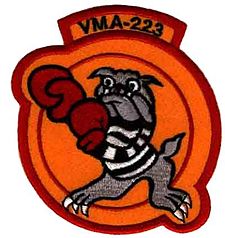VMF-223
| Marine Attacks Squadron 223 | |
|---|---|

VMA-223 insignia
|
|
| Active | 1 May 1942 – present |
| Country |
|
| Branch |
|
| Type | Attack squadron |
| Role | Close air support, air interdiction |
| Part of |
Marine Aircraft Group 14 2nd Marine Aircraft Wing |
| Garrison/HQ | Marine Corps Air Station Cherry Point |
| Nickname(s) | "Bulldogs" |
| Tail Code | WP |
| Engagements | |
| Commanders | |
| Current commander |
Lt. Colonel Ryan Ward |
| Notable commanders |
John Lucian Smith |
| Aircraft flown | |
| Attack |
Douglas A-4 Skyhawk McDonnell-Douglas AV-8B Harrier II |
| Fighter |
Brewster F2A Buffalo Grumman F4F Wildcat Vought F4U Corsair Grumman F9F Panther North American FJ-4B Fury |
Marine Attack Squadron 223 (VMA-223) is a United States Marine Corps fixed wing attack squadron that consists of McDonnell-Douglas AV-8B Harrier II (V/STOL) jets. The squadron is based at Marine Corps Air Station Cherry Point, North Carolina and falls under the command of Marine Aircraft Group 14 (MAG-14) and the 2nd Marine Aircraft Wing (2nd MAW). The squadron uses "Stone" as its radio callsign.
Marine Attack Squadron (VMA)-223 is one of four AV-8B Harrier squadrons assigned to Marine Aircraft Group 14, 2nd Marine Aircraft Wing. Its mission is to provide offensive air support, armed reconnaissance, and air-defense for Marine expeditionary forces.
Marine Fighter Squadron 223 (VMF-223) was commissioned on May 1, 1942 at Marine Corps Air Station Ewa, Oahu, Hawaii. The "Bulldogs" first operational aircraft was the Brewster F2A Buffalo. They left Hawaii for combat equipped with the Grumman F4F Wildcat. VMA-223 became the first fighter squadron committed to combat during the Battle of Guadalcanal when they landed at Henderson Field on August 20, 1942. Upon arriving, the squadron became part of the Cactus Air Force and for the next two months slugged it out with Japanese pilots, based out of Rabaul, for control of the skies over Guadalcanal. VMF-223 left the island on October 16, 1942 having accounted for 110½ enemy aircraft shot down including that of Japanese ace Junichi Sasai. The two leading aces in the squadron were the commanding officer, Major John L. Smith, with nineteen confirmed shoot downs and Marion E. Carl who was creditted with sixteen. Smith was to be awarded the Medal of Honor for heroism and Captain Carl would win the first of his two Navy Crosses for these actions. These victories would come at the cost of six pilots killed and six wounded, and only eight Wildcats still operational.
...
Wikipedia
